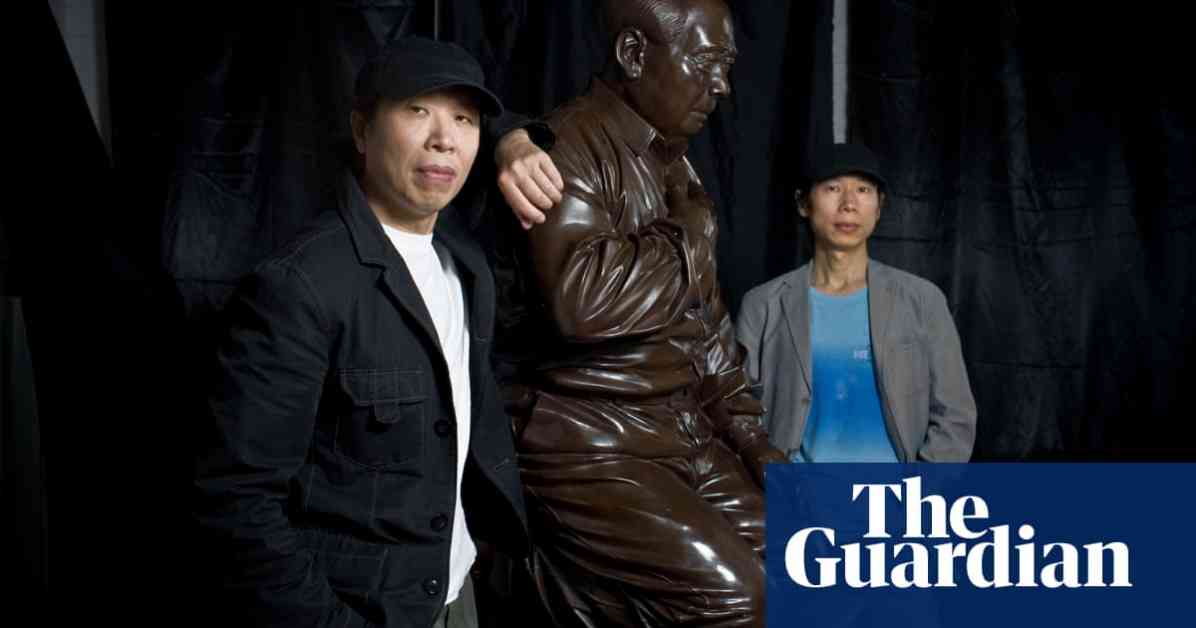Chinese artist Gao Zhen, renowned for his provocative works critiquing the Cultural Revolution, has recently found himself in hot water with Chinese authorities. Gao Zhen’s brother and artistic collaborator, Gao Qiang, revealed that his brother was detained by police in Sanhe, located east of Beijing. The incident occurred on August 26th when authorities conducted a raid on the brothers’ art studio, seizing several artworks and ultimately arresting Gao Zhen after he refused to surrender his mobile phone.
Gao Qiang shared with the Guardian that the police did not provide specific details regarding the reason for the detention, only mentioning that there had been a complaint. Subsequently, the Sanhe public security bureau informed Gao Zhen’s wife the following day that her husband was suspected of slandering China’s heroes and martyrs, an offense that carries potential jail sentences of up to three years.
The Gao brothers are known for their daring works that depict Mao Zedong, the former Communist party leader who instigated the Cultural Revolution during the 1960s and 70s. Gao Qiang clarified that all the confiscated artworks were over a decade old and centered on themes related to the Cultural Revolution. Interestingly, these pieces were created before the enactment of the law against insulting heroes and martyrs, which was introduced in 2018 without associated jail sentences but later revised in 2021 to include harsher penalties.
Artistic Expression vs. Legal Boundaries
Gao Qiang passionately defended his brother’s artistic freedom, arguing that retroactively punishing actions that predate the implementation of new laws contradicts the fundamental principle of non-retroactivity, a cornerstone of modern legal systems. He emphasized the distinction between artistic creation and criminal conduct, asserting that Gao Zhen’s works were intended as a commentary on historical events rather than an affront to national heroes.
In a poignant statement to Artsnet, Gao Qiang disclosed that the Gao brothers had refrained from producing artworks related to the Cultural Revolution since their father, who was labeled a “class enemy” and reportedly took his own life while imprisoned during that tumultuous period. The emotional toll of grappling with the ghosts of the past had led them to cease such creations, seeking to move beyond the shadows cast by that dark chapter in Chinese history.
Global Impact of Artistic Suppression
The arrest of Gao Zhen has reverberated beyond the borders of China, eliciting concerns about the stifling of artistic expression under the increasingly authoritarian regime of President Xi Jinping. Social and cultural groups, as well as individual figures like artists, lawyers, dissidents, and journalists, have faced heightened scrutiny and repression, with authorities leveraging vague laws to target perceived dissent.
One of the most notable cases is that of citizen journalist Zhang Zhan, who gained international attention for her reporting from Wuhan during the Covid-19 pandemic. Zhang was recently re-detained by authorities in her hometown in Shaanxi, mere months after her release from imprisonment. The circumstances surrounding her arrest remain murky, with supporters expressing alarm and urging diplomatic intervention to ensure her safety.
The re-incarceration of Zhang Zhan underscores the Chinese government’s continued crackdown on independent journalism and dissenting voices. Despite enduring years of imprisonment and surveillance, Zhang’s commitment to truth-telling has made her a symbol of resilience in the face of oppressive tactics aimed at silencing those who dare to challenge the official narrative.
International Response and Advocacy
Human rights organizations, such as Reporters Without Borders, have condemned Zhang Zhan’s re-arrest and called for swift action to protect her from further persecution. Rebecca Vincent, the director of campaigns at RSF, expressed grave concerns about the Chinese authorities’ persistent efforts to punish Zhang for her courageous journalism, highlighting the urgent need for global solidarity in defending press freedom and individual rights.
The Pudong detention center, where Zhang Zhan is reportedly being held, declined to provide any clarifications on her status or the grounds for her detention. This lack of transparency only adds to the apprehension surrounding her well-being and underscores the challenges faced by those who speak truth to power in repressive environments.
In the broader context of China’s tightening grip on dissent and creative expression, the case of Gao Zhen serves as a poignant reminder of the risks artists and activists take to challenge historical narratives and societal norms. The legacy of the Cultural Revolution continues to cast a long shadow over artistic freedom in China, as individuals like Gao Zhen navigate the treacherous terrain of state censorship and punitive measures.
As the global community grapples with the implications of China’s crackdown on dissent and artistic expression, the plight of figures like Gao Zhen and Zhang Zhan serves as a stark reminder of the enduring struggle for freedom of speech and human rights in authoritarian regimes. The voices of those who dare to defy oppressive systems resonate far beyond their individual circumstances, calling attention to the universal values of truth, justice, and creative freedom that must be safeguarded at all costs.


























